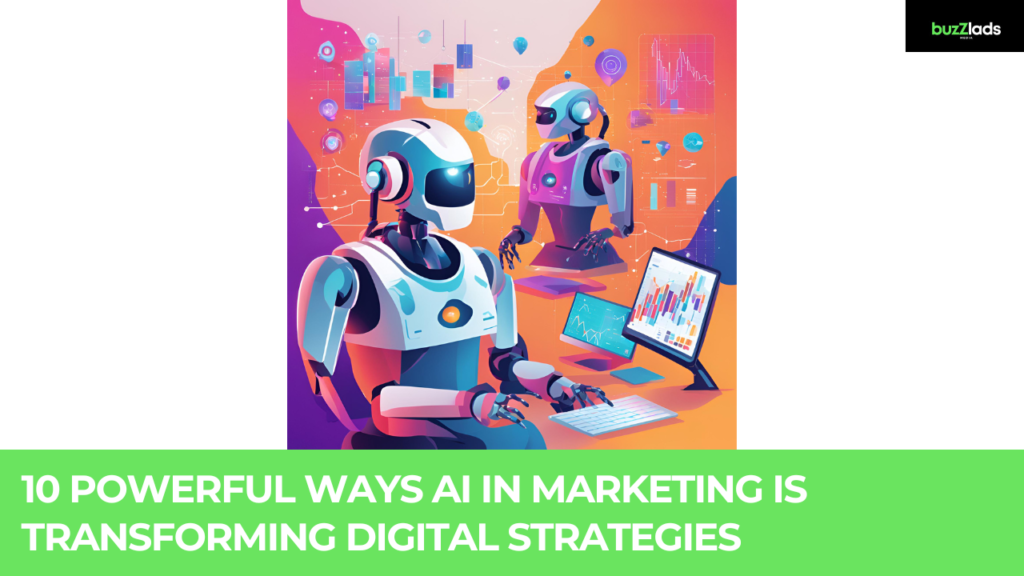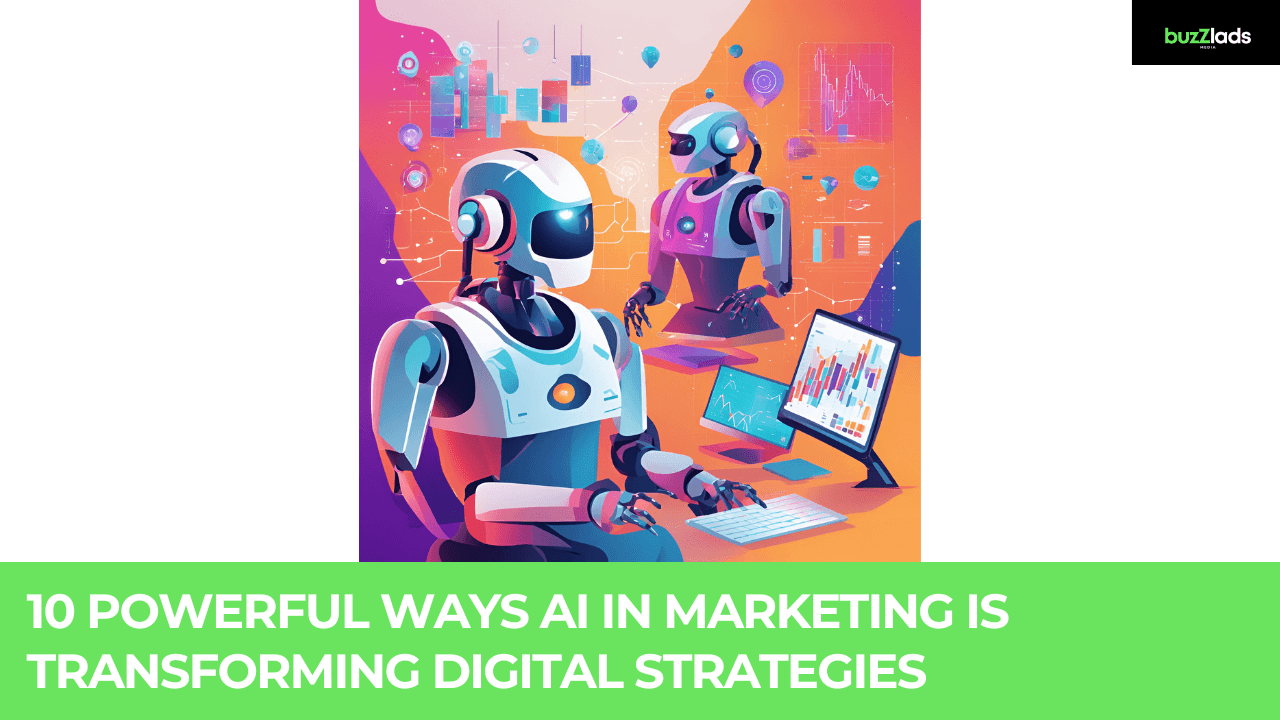
Introduction
Artificial Intelligence (AI) is revolutionizing the marketing landscape, transforming how businesses interact with their audiences and optimize their strategies. From personalized campaigns to data-driven insights, AI has become an indispensable tool in digital marketing. This blog explores the dynamic role of AI in marketing, covering essential aspects like AI in digital marketing, content creation, sales, and social media. Let’s dive in!
What is AI?
AI, or Artificial Intelligence, refers to the simulation of human intelligence by machines. It encompasses a variety of technologies, including machine learning, natural language processing (NLP), and computer vision. AI can analyze large data sets, recognize patterns, and make decisions—all at a scale and speed that humans can’t match.
Types of AI:
- Narrow AI: Specialized for specific tasks, like voice assistants (e.g., Siri, Alexa).
- General AI: Hypothetical AI that can perform any intellectual task a human can do.
AI’s applications span various industries, from healthcare to finance, but its impact on marketing is particularly profound.
What is Digital Marketing?
Digital marketing involves using digital channels—like search engines, social media, email, and websites—to promote products or services. It has become essential in today’s connected world, enabling businesses to reach global audiences and tailor their messages.
Key Components of Digital Marketing:
- Search Engine Optimization (SEO): Enhancing website visibility on search engines.
- Social Media Marketing: Engaging audiences on platforms like Facebook, Instagram, and LinkedIn.
- Pay-Per-Click (PPC) Advertising: Paying for ad placements on search engines and social media.
- Content Marketing: Creating valuable content to attract and retain customers.
AI in Digital Marketing
AI in digital marketing leverages data analytics and machine learning to improve marketing strategies. It helps in automating tasks, analyzing consumer behavior, and personalizing campaigns.
Examples of AI in Digital Marketing:
- Personalized Recommendations: AI algorithms analyze browsing behavior to suggest products or content.
- Chatbots: Provide instant customer support and engagement.
- Predictive Analytics: Forecast trends and customer behavior.
Real-World Example: BuzzLads Media implemented AI recommendation engines similar to those used by Netflix. By analyzing user behavior and preferences, they deliver personalized content suggestions, significantly boosting engagement and retention for their clients’ platforms.
The Role of AI in Marketing
AI in Marketing is multifaceted, offering numerous benefits that streamline processes and enhance effectiveness.
Key Roles:
- Enhanced Customer Insights: AI processes vast amounts of data to provide deep insights into customer behavior.
- Predictive Analytics: Anticipates customer needs and trends, allowing marketers to be proactive.
- Automation: Automates repetitive tasks like email campaigns and social media posts, freeing up time for strategic planning.
How to Use AI in Marketing
Implementing AI in marketing might seem daunting, but it’s simpler than you think. Here’s a step-by-step guide:
- Identify Your Goals: Determine what you want to achieve—better customer insights, automation, or personalized marketing.
- Choose the Right Tools: Select AI tools that align with your goals (e.g., ChatGPT for content, Jasper AI for copywriting).
- Integrate AI into Existing Systems: Ensure AI tools can integrate with your CRM or marketing platforms.
- Train Your Team: Provide training to help your team understand how to use AI effectively.
Best Practices:
- Start small—implement AI in one area before scaling up.
- Use data ethically and transparently.
- Continuously monitor and adjust AI strategies based on performance.
Use of AI in Content Marketing
Content marketing is a critical component of digital marketing, and AI has taken it to the next level. AI can generate content, optimize it for SEO, and even personalize it for different audience segments.
Generative AI in Content Marketing:
Generative AI tools like ChatGPT and Jasper AI can create high-quality content quickly. These tools use NLP to generate human-like text, helping marketers produce blogs, social media posts, and even video scripts.
Example: AI can analyze trending topics and suggest blog ideas or create social media content calendars.
Generative AI in Marketing
Generative AI in marketing is changing the way marketing teams create and deliver content. By leveraging machine learning algorithms, generative AI can produce unique, human-like content that resonates with target audiences. This technology goes beyond traditional automation, providing dynamic solutions to complex marketing challenges.
How Generative AI in Marketing Works:
- Content Creation: Tools like ChatGPT generate blog posts, email copies, and social media content with minimal input.
- Image and Video Generation: Platforms such as DALL-E can create visuals based on text prompts, enhancing creative campaigns.
- Ad Copy Optimization: Generative AI analyzes past campaign performance to craft high-performing ad copies.
Example: Coca-Cola used generative AI to create personalized ad experiences, boosting engagement and conversion rates.
Benefits of Generative AI:
- Scalability: Produce large volumes of content quickly.
- Personalization: Tailor content to individual user preferences.
- Cost Efficiency: Reduce the need for large creative teams.
AI Marketing Tools
AI tools have become essential for modern marketers, offering capabilities ranging from data analysis to content creation. Here are some of the top AI in marketing tools:
Top AI Tools for Marketing:
- ChatGPT: An AI language model for content creation, customer service chatbots, and more.
- Jasper AI: Specializes in content generation, especially useful for SEO-optimized blogs and ad copies.
- Google AI Tools: Includes Google Analytics, Google Trends, and Google Ads, helping marketers gain insights and optimize campaigns.
- Invideo AI: A tool for creating and editing videos using AI technology.
- Blackbox AI: An all-in-one AI tool for automating marketing processes and data analysis.
How to Choose the Right Tool:
- Define your needs: Do you need content, data analysis, or customer support automation?
- Compare features: Evaluate the tools’ capabilities and integrations.
- Test and optimize: Start with free trials and assess performance before committing.
AI in Social Media Marketing
Social media is a critical channel for marketing, and AI can significantly enhance performance and engagement. AI tools can automate posts, analyze user behavior, and even respond to comments.
Key Applications:
- Content Scheduling and Automation: AI platforms like Hootsuite and Buffer use algorithms to determine the best times to post content.
- Sentiment Analysis: AI tools analyze comments and mentions to gauge public sentiment and brand perception.
- Influencer Marketing: AI helps identify the best influencers for a campaign by analyzing engagement metrics and audience demographics.
Example: Spotify uses AI to curate personalized playlists and social media campaigns, increasing user engagement and loyalty.
AI in Marketing and Sales
AI doesn’t just impact marketing—it also revolutionizes sales. By integrating AI into sales processes, companies can identify high-value leads and close deals more efficiently.
How AI Enhances Sales:
- Lead Scoring: AI algorithms analyze customer data to identify the most promising leads.
- CRM Optimization: AI tools enhance customer relationship management by providing insights into customer behavior.
- Sales Forecasting: Predictive analytics help sales teams anticipate trends and adjust strategies accordingly.
Example: Salesforce uses AI-driven tools like Einstein to help sales teams streamline their workflows and close more deals.
AI and Google Marketing Tools
Google offers a suite of AI-powered tools that help marketers optimize their campaigns and gain valuable insights.
Key Google AI Tools:
- Google Analytics: Provides deep insights into website traffic and user behavior.
- Google Trends: Analyzes search trends to help marketers identify popular topics.
- Google Ads: Uses AI to optimize ad performance, ensuring better ROI.
Benefits of Using Google AI Tools:
- Data-Driven Decisions: Access real-time data for informed decision-making.
- Improved Targeting: AI helps segment audiences and deliver personalized ads.
- Efficiency: Automate tasks like bidding and keyword optimization.
AI in Marketing Courses
As AI continues to dominate the marketing landscape, learning how to use AI effectively is crucial for marketers. Many online courses and certifications can help you stay ahead of the curve of AI in Marketing.
Recommended AI Marketing Courses:
- Google AI Certification: Covers the basics of AI and machine learning.
- Coursera’s AI for Marketing Course: Offers practical insights into integrating AI into marketing strategies.
- HubSpot Academy: Provides free courses on AI and automation in marketing.
Why You Should Learn AI in Marketing:
- Career Growth: AI skills are in high demand, offering lucrative job opportunities.
- Stay Competitive: Understanding AI helps you stay ahead of competitors.
- Enhanced Strategies: Learn how to leverage AI for better campaign performance.
Privacy and Real-Time AI Applications
Real-time AI applications in smartphones and IoT devices are becoming more prevalent, raising important questions about privacy and security.
How Real-Time AI Enhances Privacy:
- Edge Computing: Processes data locally on devices, reducing the need to share data with the cloud.
- Encryption: AI algorithms can enhance encryption methods, protecting sensitive data.
Example: Apple uses AI in its iPhones for on-device processing, enhancing privacy and user experience.
Ethical Considerations:
- Transparency: Ensure AI decisions are explainable.
- Data Protection: Comply with regulations like GDPR.
- Bias Mitigation: Develop AI models that are fair and unbiased.
Conclusion
AI is transforming the marketing industry, offering innovative solutions that enhance efficiency, personalization, and customer engagement. From generative AI tools to real-time analytics, the possibilities are endless. Marketers who embrace AI now will not only stay competitive but also lead the way into the future of digital marketing.
1. What is the role of AI in digital marketing?
AI enhances digital marketing by automating tasks, providing customer insights, and optimizing campaigns for better performance.
2. How can AI improve content marketing?
AI tools can generate high-quality content, optimize it for SEO, and personalize it for different audiences.
3. What are the best AI tools for marketing?
Some top AI tools include ChatGPT, Jasper AI, Google AI tools, and Hootsuite.
4. How does generative AI work in marketing?
Generative AI creates content, images, and videos using machine learning models, helping marketers scale their creative efforts.
5. What are the privacy concerns with AI in marketing?
AI raises concerns about data privacy and security, making it crucial for businesses to use transparent and compliant AI practices.




